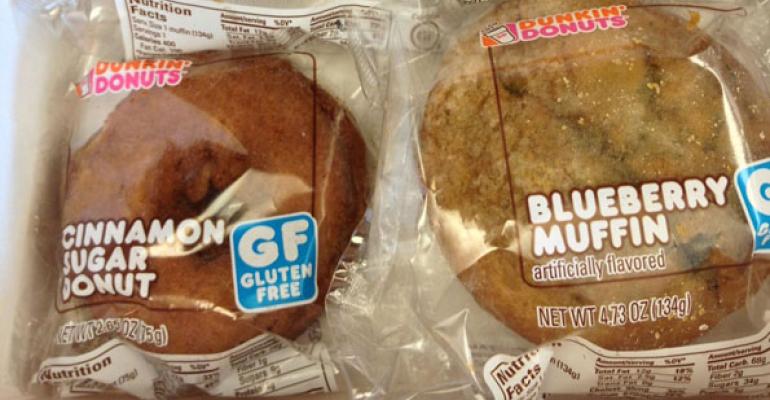Industry experts praised Dunkin' Donuts' decision to roll out gluten-free menu selections later this year but also voiced doubts that the new items will do much to boost the brand's sales.
The Canton, Mass.-based beverage-snack brand, which is owned by Dunkin' Brands Group Inc., acknowledged last week that it planned to introduce two new menu items chainwide — a gluten-free Cinnamon Sugar Donut and a gluten-free Blueberry Muffin — before the end of 2013.
A spokeswoman for the 10,500-unit Dunkin’ Donuts told Nation's Restaurant News that the gluten-free items had first been tested in select stores in chain's home market of Massachusetts earlier this year and are currently available in restaurants throughout the greater Hartford, Conn., area.
RELATED
• How 5 restaurant chains went gluten free
• NPD: 'Gluten free' keeps growing
• More food and beverage news
“We are pleased with the results of the test, and we plan to offer the gluten-free products at participating Dunkin' Donuts restaurants later this year,” she said.
The suggested retail price for the gluten-free Cinnamon Sugar Donut is $1.89 and the gluten-free Blueberry Muffin is $2.39.
The Dunkin' spokeswoman said the new items would provide guests with new options for people with food and dietary restrictions. “We understand that sensitivities to food ingredients such as gluten are a serious concern for certain guests,” she said.
Joy Dubost, director of nutrition for the National Restaurant Association, said about 1 percent of the population has celiac disease, an autoimmune disorder of the small intestine, and is gluten intolerant.
Because gluten is naturally occurring in products containing wheat, rye and barley, restaurateurs offering gluten-free items run the risk of cross-contamination, she said.
Dubost also noted that preparing truly gluten-free items can be complicated. “You need a separate area; there can be no interaction with other foods,” she said. “You need separate equipment. You almost need your own separate kitchen. It's a challenge.”
To address that challenge, Dunkin' Donuts prepares its gluten-free products in a dedicated facility at which they are individually packaged and then shipped to participating outlets. Both items are certified gluten-free by the Gluten Free Certification Organization, the company said.
Dunkin' Donuts is the latest foodservice chain to address the growing trend toward offering gluten-free menu items. Last year, Domino’s became the nation’s largest pizza chain to feature a gluten-free crust option. However, the chain also acknowledged at the time that cross-contamination was a risk and that the pizza may not be an option for those with celiac disease.
Full-service chains like Chevys Fresh Mex and P.F. Chang's also feature gluten-free options.
Following the gluten-free trend
(Continued from page 1)
While experts applaud chains for making the option available to guests, they doubt that such products will nudge the sales needle upwards much.
Nancy Kruse, president of The Kruse Co. in Atlanta and a contributor to NRN, said, “Dunkin' Donuts is smart to add a gluten-free option, not only to accommodate consumers who suffer from true gluten intolerance, but also to eliminate a potential veto vote from patrons who have embraced gluten-free products as a dietary regime.”
However, she said it’s likely the product will never represent a huge percentage of sales. Nevertheless, Kruse called it “a smart business move.”
Fred LeFranc, chief executive and president of Results Thru Strategy, a consultancy in Charlotte, N.C., said he has observed a rising awareness among the public over the past six years about the importance of menu items connected with health, wellness and allergies.
“The problem has not been whether these types of products are available,” he said. “It is whether or not a sufficient number of people will buy them in enough quantities to ensure rotation and freshness.”
However, he added, “I applaud Dunkin’ Donuts in their decision. It is reminiscent of when Pepsi decided well in advance of public opinion to go to baked instead of fried snacks. Now we just have to see if there is a sales lift as a result.”
While there is a demand for such products from the small percentage of the population that is truly gluten intolerant, “there also is a growing interest in gluten-free diets over and above what is a medically necessity,” according to Dennis Lombardi, executive vice president of foodservice strategies for WD Partners, a consultancy based in Columbus, Ohio.
Offering gluten-free options, in fact, has emerged as a hot trend throughout the restaurant industry. Dubost pointed out that interest in gluten-free products ranked first among quick-service operators in the NRA’s recent What’s Hot survey. It ranked No. 7 among overall trends, she said.
“The challenge of rolling out such items is how much of a lift will it create for them,” said Lombardi. “It opens the question, 'How many SKUs do you add for a relatively small segment of consumer?'”
Meanwhile, the retail food and restaurant industries are waiting for the U.S. government to publish regulations that define which products may be advertised as being gluten-free and which may not. Dubost said the U.S. Food and Drug Administration is working on rules for packaged foods, but they will likely also apply to restaurant food as well. “If a restaurant claims an item is gluten-free, the FDA will expect the restaurant to follow the regulations. We may expect to see tighter controls in the [foodservice] industry then.”
Dubost said the new rules could be published “any day now.”
Contact Paul Frumkin at [email protected].
Follow him on Twitter: @NRNPaul




